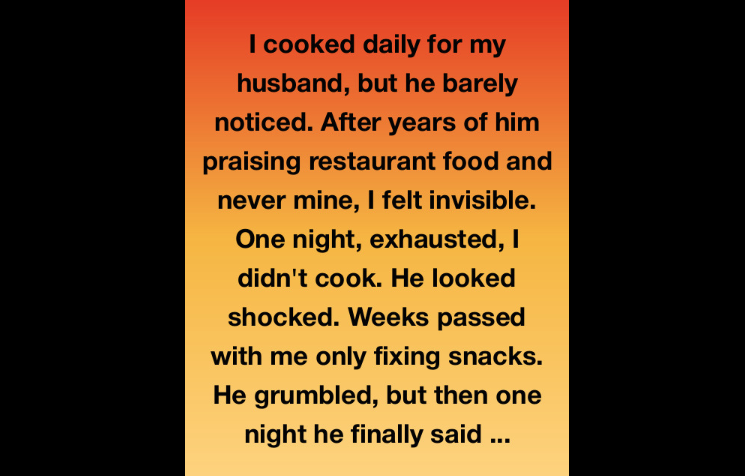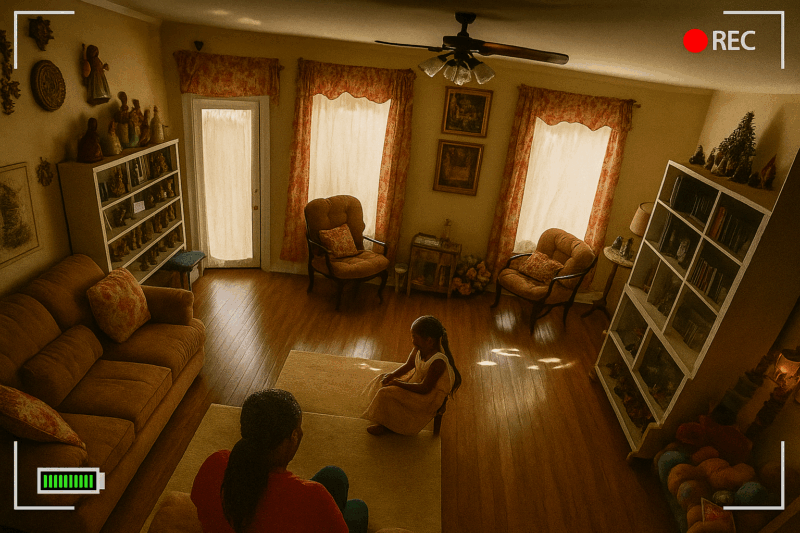I prepared meals every day for my husband, yet he scarcely acknowledged my efforts. For many years, he reserved his highest praise for restaurant dining and offered none for my cooking, leaving me feeling like an unobserved presence. One evening, completely drained, I chose not to prepare dinner. The surprise on his face was evident. Weeks passed with me offering simple snacks as meals. He expressed his dissatisfaction with mutters, until one night he finally posed the question:
“Why don’t you prepare meals as you once did?”
I stood at the kitchen counter, slicing an apple, and I did not turn to face him.
“Why would I?” I inquired, my tone composed.
He blinked, clearly perplexed. “Because you always did. You seemed to take such pleasure in it.”
“No. My devotion was to you. Cooking was simply one method I used to attempt to demonstrate that.”
The ensuing silence between us expanded greatly. He offered no further statements that night.
We had been married for twelve years. I had felt an intense affection for him at one point, and perhaps a fragment of that feeling lingered. However, as time progressed, I had slowly faded into the background of that relationship. Every word of appreciation he offered was directed toward someone else’s prepared dish, someone else’s investment of time. Whenever we dined out, he would speak extensively about the perfect seasoning of the steak, the soft texture of the rice, the tenderness of the chicken.
Yet, when I dedicated hours to cooking at home? Absolute silence. Not a single remark. Sometimes he never even lifted his gaze from his phone.
Initially, I rationalized the situation, telling myself it held no importance. That perhaps this was simply his natural manner. Nevertheless, following an abundance of ignored dinners, one begins to feel like an ethereal presence in one’s own dwelling.
The very first night I skipped cooking, I anticipated a conflict. Instead, he foraged through the refrigerator for leftovers and did not inquire about it at all. The following evening, I arranged crackers, assorted cheeses, and fruit on a wooden platter and named it “dinner.” Still no acknowledgment, merely another focused look at his digital screen.
However, by the start of the third week, he recognized the shift.
“You have changed,” he muttered late one night, seated opposite me with an unappealing, dry sandwich in his hand.
“No,” I stated softly. “You simply ceased to perceive my presence.”
It was around that period that I began taking solitary walks in the evenings. They were not lengthy, lasting twenty or thirty minutes after our evening meal. I would breathe deeply of the cool air, listen to the evening birds settling within the trees, and allow the quiet to offer me comfort. It was the only span of time I felt heard—by the surrounding world, if not by my husband.
During one of those walks, I encountered Mrs. Dalia, our neighbor residing directly across the street. She was tending to her rose bushes in the descending light, and we initiated a conversation. She was a widow, in her seventies, and her conversation was rich with personal histories. We spoke for almost an hour that initial evening.
“You realize,” she remarked, extending a homemade cookie from a tin, “devotion without recognition resembles water without sun. You can pour forth all you possess, but things will fail to flourish.”
That insight resonated deeply within me.
I started visiting her with greater frequency. Her kitchen was fragrant with the scents of cardamom and cloves, and she enjoyed sharing her older recipes. One day, she retrieved a worn box and declared, “These belonged to my mother. Every one is handwritten. I wish you to keep them.”
I momentarily paused. “Me?”
She offered a kind smile. “Indeed, you. Someone who continues to cook with sincere feeling ought to carry these traditions forward.”
Returning home, I carefully turned the yellowed pages, filled with wonder. There was an inherent power in handling those recipes—in reading the affectionate notes scribbled into the margins—that awakened a powerful feeling within me.
I resumed cooking. But this time, not for my husband.
I cooked for Dalia.
I would bring her steaming lentil soup, tender yeast rolls, spicy okra preparations. She would light up with joy and refer to me as her “kitchen daughter.” We exchanged personal histories over mugs of tea, shared moments of laughter, and sometimes wept together.
My husband began to notice the savory aromas returning to the house but never received a plate of the food. Not unless he specifically requested it—and he did not do so for a significant time.
However, one Saturday afternoon, he entered the kitchen while I was frying samosas for Dalia. He lingered near the countertop.
“Who are all these preparations intended for?” he asked.
“Mrs. Dalia,” I answered, keeping my focus on the task.
He paused. “You never prepared samosas for me.”
“Yes, I did,” I stated, very calmly. “Twice. You mentioned they were ‘acceptable’ and ordered a pizza afterwards.”
He either genuinely failed to recall or decided to pretend he didn’t. He merely shifted his posture and exited the room.
That evening, he finally made the request.
“May I taste some of that curry you created?”
I hesitated. I looked directly at him. I really focused my gaze.
“Why?” I asked.
He seemed uncertain. “Because the aroma is pleasing.”
I handed him a plate. Only one portion.
He consumed it slowly, appearing to genuinely pay attention to the flavors. Then he stated, “This is excellent.”
I simply nodded. “I am aware of that.”
We did not exchange further conversation that night, but a fundamental change had occurred.
Over the subsequent few weeks, he started to notice more. Not exclusively the prepared food—but me. He would ask where I was going when I left, remark upon my selection of earrings, or offer to assist with washing the dishes.
But it felt… belated.
Excessively so.
I did not harbor resentment. I was simply exhausted. Weary in the way people become when they have maintained a high-level effort for many years and finally pause to comprehend they were the sole participant in that endeavor.
One evening, I was again at Dalia’s home, and she observed, “He is making an effort now, isn’t he?”
I confirmed this with a nod.
She offered me a long, empathetic look. “Do not revert to being an unseen person. Whatever direction you choose, maintain your visibility.”
That night, I sat down with my husband and said, “We need to have a sincere conversation.”
He appeared apprehensive.
“I have devoted years to trying to be acknowledged. I gave extensively and seldom received anything in return.”
“I comprehend,” he said, his voice barely audible.
“Do you?” I questioned. “Truly? Or do you simply miss the sense of comfort I provided?”
He remained silent.
“I require more. Not just in terms of cooked meals or spoken words, but in the foundation of our partnership. In the substance of our shared life.”
“I am capable of changing,” he responded quickly. “I will perform better. I offer my sincere promise.”
I nodded once. “Understood. Then you must demonstrate that to me.”
And he genuinely made the attempt. He truly did.
He began cooking one meal each week. The first time, he scorched the rice and the chicken was partially raw, but I smiled and expressed my thanks. Because it represented effort.
He took the initiative to plan a brief weekend excursion for the two of us. He made all the reservations himself. He stated he wished to “commence anew.”
I agreed to go.
Yet, a feeling of absence persisted.
During that trip, as we strolled along the ocean beach, he turned toward me and said, “I think I allowed myself to forget who you were. I became so accustomed to your constant presence, I ceased to value it.”
I valued his candidness.
However, deep within myself, I understood I had transformed.
I no longer required his validation to feel completely whole. I had meticulously rebuilt aspects of my character through those quiet evening walks, those intimate discussions with Dalia, those treasured recipes passed down with affection.
Therefore, following our return home, I informed him I needed space.
Not a complete end to the marriage. Not at that time. Simply space.
He was distraught. He pleaded with me. He wept openly.
But I maintained my resolve.
I rented a small living space near the neighborhood park. It possessed only one bedroom, but it was filled with light and deeply quiet.
Dalia made frequent visits. She brought me comforting tea and more of her stories.
I enrolled in a community cooking seminar, and I started sharing the heirloom recipes online, posting images and the associated personal histories. Surprisingly, people responded enthusiastically. They commented, they exchanged their own family traditions, they requested further content.
Within a few months, I had developed a small, dedicated following. Following that, a local newspaper featured me in a story focusing on “reawakening forgotten culinary traditions.”
I experienced a genuine smile when I saw the article. Not because of the public recognition—but because I felt truly seen. Authentically, profoundly perceived.
My husband continued to seek contact. He began attending professional therapy sessions. He sent letters, physical ones, filled with sincere reflections and statements of apology.
After a complete year, we arranged to meet for a luncheon.
He presented a different appearance. Softer. More attuned to the world.
He said, “I came to the realization that I didn’t exclusively neglect you—I also neglected my own self. I stopped evolving. I believed simple comfort was a sufficient state. But you demonstrated to me what devotion looks like when it is truly alive.”
I nodded my acknowledgment. “I am happy you have gained that perception now.”
We did not reconcile our marriage.
Not because of lingering resentment. But because occasionally, personal development guides one in entirely new directions.
We maintained a friendship. We treated one another with mutual respect.
He eventually began volunteering his time at a facility that provided meals for the needy. He said it aided him in remaining grounded.
And as for me?
I initiated the opening of a small establishment for food and coffee. I named it “Saffron Soul,” drawing inspiration from one of the recipes discovered in Dalia’s special box. She was the one who performed the ceremonial cutting of the ribbon at the grand opening celebration.
It was not an elaborate or high-end place. It was simply a welcoming space with menus written by hand and calm, low-volume music.
People visited primarily for the food, but they stayed for the associated narratives.
Each prepared dish was accompanied by a brief written note—about the woman who originally created it, the personal memory connected to it, or the enduring life lesson it communicated.
One of the most frequently read notes stated:
“When affection is not acknowledged, it fades away. But when it is firmly rooted in self-value, it will invariably bloom once more.”
That specific one was authored by me.
Reflecting upon everything now, I feel profound gratitude for the entirety of the experience. Even the period of being overlooked. It served as the strong impetus that propelled me toward self-rediscovery.
Occasionally, the very people who cause you deep distress are the ones who unintentionally unlock the entryway to your eventual thriving.
If you have ever experienced the feeling of being unnoticed, know this absolute truth: you are never invisible. You are simply awaiting your moment to fully flower.
So, pour your passion into your cooking. Take your evening walks. Cultivate your beautiful roses.
Because even if the people around you fail to notice it now, you will notice.
And that recognition is more than enough to set everything in motion.




